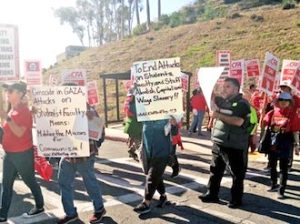Strike at Cal State University here ♦ Idealism and Materialism, Part II here ♦

California State University, Los Angeles (USA), December 6— “Can I take a picture of your poster?” a woman asked during a one-day faculty strike. It read, “Genocide in Gaza, Attacks on Students and Faculty Mean: Mobilize the Masses for Communism!” She took our leaflet and Red Flag, then returned asking for another paper for her husband, a professor.
“Take a few more for your friends and family,” a comrade said. She gladly did. We exchanged contact information to keep in touch. We made contacts with several professors, students and staff.
We distributed almost 500 papers and 600 leaflets, “Strike Against Racist, Imperialist Capitalism! Let’s Fight for the Communist World We Need.”
This strike was third in a series in the largest US university system. Forty-six thousand faculty and staff demanded a 12% wage increase in the first year. Like all workers, they need to end capitalist wage slavery and the schools that perpetuate it.
Last week, CSU students protested a planned 36% tuition increase. Their banner, “Tuition rises so bombs can fall,” made the connection to US-supported genocide in Gaza.
Idealism and Materialism: Part II: How Can We Make Communist Ideas Grip the Masses?
Part I outlined the philosophical concept of the ideal. The ideal includes ideas, concepts, theories, doctrines, works of art. It includes anything that is a product of human thinking. These mental products can be thought about, agreed with, rejected, or shared by different people. (You can read part I here)
Philosophical materialism says that the ideal is produced by the material, by human brains. It is molded by the material structures of nature and society that people interact with.
Knowledge consists of ideas that accurately represent the material reality that people have learned about by working with that reality. To know how to build a house, the best way is to be part of a crew that builds one.
This process of learning through practical activity also happens in political movements for social change. The struggle for communism must be planned using knowledge and implemented through a material process of political actions. Those actions are guided by communist ideas.
Part I quoted Marx’s point that “theory also becomes a material force as soon as it has gripped the masses.” A theory does not become a material force just because people understand it, but only when it grips them, that is, moves them into action.
The most important part of organizing the movement for communism is the material process of making communist theory grip the masses.
This communist political work always involves creating social relationships. In these relationships, our friends can understand communist ideas and add to them as they participate in class struggle against capitalism.
Materialism recognizes that the ideal is not all-powerful. The material and the ideal influence each other, but materialism says that the material has the upper hand. In general, the material has a stronger effect in producing and molding the ideal than vice versa.
People who interact with cars know that a flat tire must be fixed before the car can run. Ordinary experience with material reality guarantees that true belief. The capitalist media, however, has the power to create false beliefs in many people. Both true and false ideas are produced by material systems.
Philosophical idealism says that the ideal has the power to dominate the material. Idealism involves saying that ideal things can have effects which they actually cannot have. For example, it is idealism to think that “democratic values” can stop fascism. If the capitalists need fascism to continue their rule, they have the material power to make it happen unless communist revolution destroys them first.
It is idealism to think that the enslavement of Africans was the result of racist thinking by white people. The opposite is true. The enslavers invented and spread the lie that Africans were “natural slaves” to justify enslaving them.
Religious belief is a form of idealism. It is idealism to expect a God or gods, ideal beings invented by people, to hold back capitalism’s material oppression of the working class.
The material generally dominates the ideal, but there are times when the ideal has a decisive effect on the material. Sometimes an army that has fewer powerful weapons defeats a better equipped one because its fighters are more committed and plan better.
As the material contradictions of the capitalist system heat up, as it barrels toward war and fascism, the political thinking and commitment of the working class can determine whether it can create communism and escape the hell of capitalism or not. That is the situation that our movement can create and must create.
Read Our Articles about Dialectical Materialism here.

